|
|
|
Sort Order |
|
|
|
Items / Page
|
|
|
|
|
|
|
| Srl | Item |
| 1 |
ID:
078647
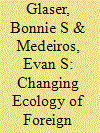

|
|
|
|
|
| Publication |
2007.
|
| Summary/Abstract |
China's rapidly proliferating global interests and evolving political environment have begun to change the international and domestic context for its foreign policy-making. This article explores the changing inputs into and processes associated with foreign policy-making in China today. It does this by analysing the shifting fortunes of "peaceful rise," one of the first new foreign policy concepts to be introduced under the Hu Jintao administration. The authors draw several implications from this narrow debate for understanding contemporary foreign policy-making in China. It provides an example of how new foreign policy ideas and strategies can come from outside the formal, central government bureaucracy, and underscores the growing relevance of think-tank analysts and university-based scholars. Finally, the authors argue that the Chinese leadership's decision to eschew "peaceful rise" in favour of "peaceful development" was fundamentally a question of terminology and thus preserved China's strategy of reassuring other nations.
|
|
|
|
|
|
|
|
|
|
|
|
|
|
|
|
| 2 |
ID:
169191


|
|
|
|
|
| Summary/Abstract |
The US-China relationship is changing in fundamental ways. Currently, the United States and China are engaged in an intensive and costly trade war that, even if resolved through negotiations, will likely not provide the basis for long-term stability. Indeed, it may carry the seeds of future confrontation. More broadly, many of the fundamental ideas that once guided the relationship are being called into question, such as engagement, cooperation, and convergence. The institutional structure of the relationship is also being tested. The well-developed and hard-worn channels of communication have been allowed to atrophy. On both sides, and especially in China, bureaucratic processes are straining to keep up with the growing diversity and complexity of a relationship that is global in scope and consequence.
|
|
|
|
|
|
|
|
|
|
|
|
|
|
|
|
| 3 |
ID:
061298


|
|
|
|
|
| Publication |
Santa Monica, Rand Corporation, 2005.
|
| Description |
xi, 55p.
|
| Standard Number |
0833036769
|
|
|
|
|
|
|
|
|
|
|
|
Copies: C:1/I:0,R:0,Q:0
Circulation
| Accession# | Call# | Current Location | Status | Policy | Location |
| 049606 | 327.51073/GOM 049606 | Main | On Shelf | General | |
|
|
|
|
| 4 |
ID:
101578
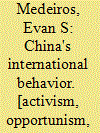

|
|
|
|
|
| Publication |
Santa Monica, Rand Corporation, 2009.
|
| Description |
xxix, 247p.
|
| Standard Number |
9780833047090
|
|
|
|
|
|
|
|
|
|
|
|
Copies: C:1/I:0,R:0,Q:0
Circulation
| Accession# | Call# | Current Location | Status | Policy | Location |
| 055634 | 327.51/MED 055634 | Main | On Shelf | General | |
|
|
|
|
| 5 |
ID:
098660
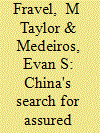

|
|
|
|
|
| Publication |
2010.
|
| Summary/Abstract |
After exploding its first nuclear device in 1964, China did not develop sufficient forces or doctrine to overcome its vulnerability to a first strike by the United States or the Soviet Union for more than three decades. Two factors explain this puzzling willingness to live with nuclear vulnerability: (1) the views and beliefs of senior leaders about the utility of nuclear weapons and the requirements of deterrence, and (2) internal organizational and political constraints on doctrinal innovation. Even as China's technical expertise grew and financial resources for modernization became available after the early 1980s, leadership beliefs have continued to shape China's approach to nuclear strategy, reflecting the idea of assured retaliation (i.e., using the fewest number of weapons to threaten an opponent with a credible second strike). The enduring effect of these leadership ideas has important implications for the trajectory of China's current efforts to modernize its nuclear force.
|
|
|
|
|
|
|
|
|
|
|
|
|
|
|
|
| 6 |
ID:
090503


|
|
|
| 7 |
ID:
179175
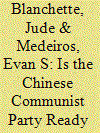

|
|
|
|
|
| Summary/Abstract |
As the Chinese Communist Party (CCP) prepares to commemorate on July 1 the 100th anniversary of its founding in 1921, it continues to confound policymakers and scholars with its expanding illiberalism amid persistent resilience, defying expectations of eventual moderation and inevitable collapse. From the vantage point of 2021, the CCP has demonstrated that it can adapt to both new and legacy challenges or, at a minimum, find creative ways to kick the can down the road. Not only is the Party resilient, it is also successful: today’s Communist Party controls more wealth, commands a more powerful military force, and can exert its influence over farther reaches of the globe than at any other point in its history.
|
|
|
|
|
|
|
|
|
|
|
|
|
|
|
|
| 8 |
ID:
069264


|
|
|
|
|
| Publication |
Santa Monica, Rand Corporation, 2005.
|
| Description |
xxv, 304p.
|
| Contents |
MG-334
|
| Standard Number |
0833037943
|
|
|
|
|
|
|
|
|
|
|
|
Copies: C:1/I:0,R:0,Q:0
Circulation
| Accession# | Call# | Current Location | Status | Policy | Location |
| 051150 | 338.4735500951/MED 051150 | Main | On Shelf | General | |
|
|
|
|
| 9 |
ID:
081970


|
|
|
|
|
| Publication |
Stanford, Stanford University Press, 2007.
|
| Description |
xv, 357p.
|
| Series |
Studies in Asian security
|
| Standard Number |
9780804755528
|
|
|
|
|
|
|
|
|
|
|
|
Copies: C:1/I:0,R:0,Q:0
Circulation
| Accession# | Call# | Current Location | Status | Policy | Location |
| 053602 | 327.17470951/MED 053602 | Main | On Shelf | General | |
|
|
|
|
| 10 |
ID:
067787


|
|
|
| 11 |
ID:
187258
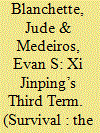

|
|
|
|
|
| Summary/Abstract |
During his first ten years in power, Chinese leader Xi Jinping has overseen substantial shifts in China’s political system and domestic economy, while also adopting a more activist and forceful foreign policy. With his likely third term beginning after the 20th Party Congress in October 2022, key questions remain about how his agenda will evolve. This article offers an assessment of Xi’s third term based on the key drivers and characteristics of Xi’s approach to domestic governance and foreign policy over the last two decades. It also explores how growing tensions and trade-offs will force policy shifts or otherwise constrain China’s growth. China seems likely to become more insular and self-referential, more frustrated and indignant and, ultimately, more alienated from the international community.
|
|
|
|
|
|
|
|
|
|
|
|
|
|
|
|
|
|
|
|
|